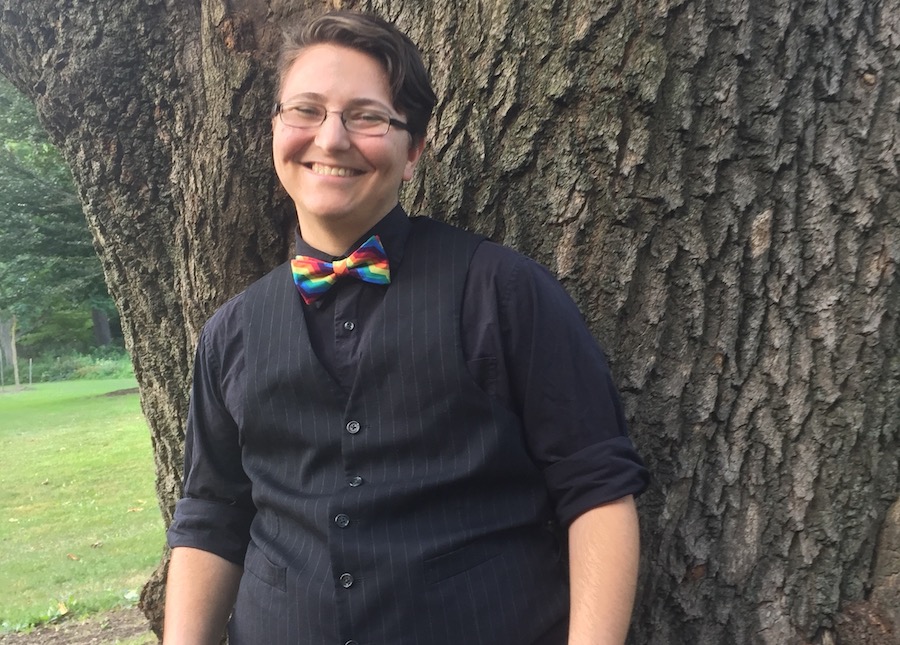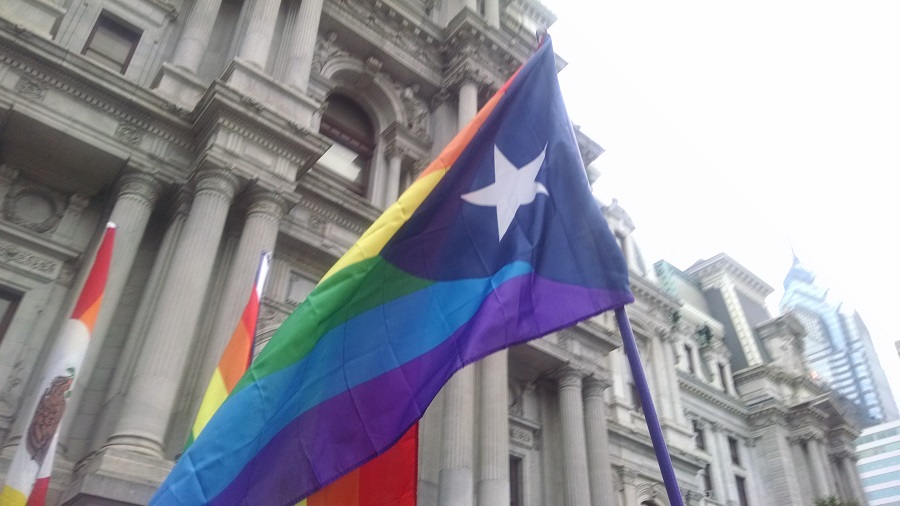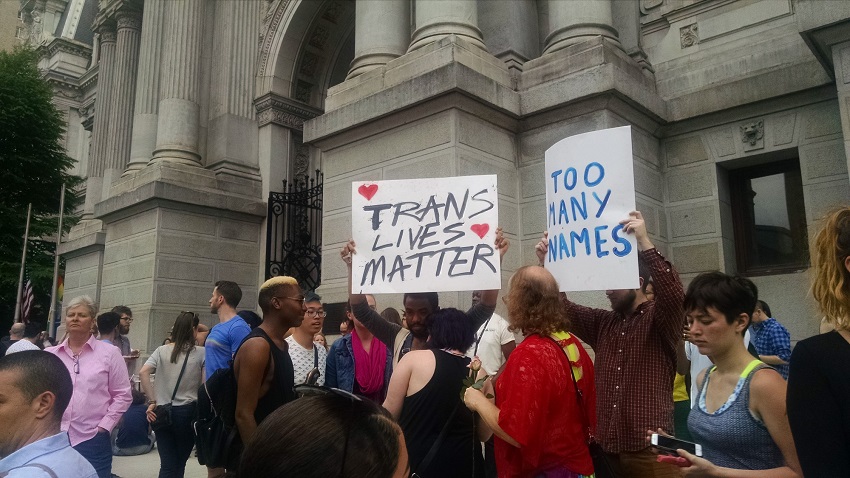
Read part 1 of "Quaker and Transgender," an interview with Elijah Walker, here.
Kody Hersh is a member of Miami Monthly Meeting in Southeastern Yearly Meeting, which is the meeting he grew up in. He is on staff for Philadelphia Yearly Meeting working on youth programs. He describes himself as a Quaker, a Christian, a writer, and musician. He identifies as “queer, trans, genderqueer, male-ish, and white, more or less able-bodied, and middle class.”
Emily McGrew: Tell me a little about your journey to Quakerism.
Kody Hersh: My parents were war correspondents in Latin America, and became pacifists doing that work and seeing what war looked like. My mom ended up working for the AFSC when they moved to Miami, then joined my meeting, and my dad joined a few years later. I don't remember ever not being Quaker. But then also, I felt like I had experiences of convincement as a teenager, where I felt like I got a deeper sense of what Quakerism could be and what my relationship with God could be like within that tradition. I identify both as raised Quaker and a convinced Friend.
Emily: Can you tell me more about what those convincement experiences were like?
Kody: I got an invitation to a Friends General Conference consultation on youth ministries. Basically, they were asking all of the affiliated yearly meetings to send one or two young people to this consultation. They were paying airfare, and I was like, "Whatever … you're going to pay my airfare, it's free! Sure, I'll go spend a weekend talking about Quakerism with people in Philadelphia." And I connected with folks there who were talking about Quakerism differently than anything I had ever heard before, with this passion that was really different than the meeting I grew up in, [which] was relatively secular and very peace- and social justice-oriented, which I identified with a lot.
Emily: How do you experience Quakerism and your spirituality? What does that look like for you?
Kody: It feels like it's in a kind of odd and complicated place right now, because I'm not attending a monthly meeting regularly, but I still feel so grounded in Quakerism as my spiritual home and way of looking at the world and thinking about my relationship with God. I feel like God and I are doing an experiment right now, in pursuing joy as a primary motivator in spiritual life, rather than sense of obligation, which is why I'm not going to meeting right now. Because I think I was going to meeting for a long time because I was like, "That's what Quakers do! If I'm going to be a good Quaker (TM), I will wake up on Sunday mornings and go to meeting." I feel like God and I are doing this thing where God is like, "Follow where you feel joy and connection, that is your obligation, that's it."
I experience Jesus as a radical teacher and living presence, as a central part of how I experience my faith and think about it. The images and metaphors that feel most deeply true to me come from Christian and Quaker traditions.

Emily: Was there a role that Quakerism and your Quaker community played in exploring your gender identity?
Kody: Through my Quaker community, I knew trans folks before I ever knew that I was trans. And that was just a huge gift, it made it so much easier to come out. Because I had seen how my parents had reacted to other trans folks coming out in my community. I knew that I had people I could talk to who had personal experience of coming out. I didn't have those connections through any other group of people except Southeastern Yearly Meeting, so that was huge. I also feel like I got this profound sense of love and community and acceptance from my meeting growing up. That made me feel like even if I did things that confused them or that they didn't quite know how to respond to, that there was no situation in which they were going to, like, not love me anymore.
Basically that describes my relationship with my parents and my relationship with my meeting, and all of that made a really solid ground for when I started to have a sense of my gender being different from what I had thought that it was, being able to explore that without fear.
Emily: Were there any stories of moments with Quakers where you were figuring that out, that you want to share?
Kody: I was young when I came out, I was 16 or 17, and I think people respond to trans kids in a way that is kind of heightened. We don't trust trans folks talking about their identities, and we don't trust kids talking about their identities and experience, so when you're a trans kid, nobody believes that you know what you're talking about and everybody will try to talk you out of it.
I go home for yearly meeting sessions every year. It is one of the only places where I get mis-pronouned regularly. This is where I developed this dollar fee system: I put a little note on my nametag that informs people of my pronouns, and tells them if they get them wrong, they owe me a dollar for every instance (there's not like a one-dollar pass; every time, you owe me a dollar.) That's been a really great system for interrupting people's guilt cycles about it. When they start apologizing and trying to tell me why and I'm like "Whatever, just give me a dollar, we're good."

Emily: What can the Quaker community do to support you, as a trans person?
Kody: I grew up and am still mostly in the liberal, unprogrammed branch of Quakerism, so that's mostly what I can speak to. I think, like a lot of progressive communities, that challenge is mostly recognizing that we have work to do. I see this in what the Society of Friends needs to do to confront racism in a serious way, or what we need to do to confront the ways that patriarchy functions within the Religious Society of Friends. The language that comes to mind is, the first step is recognizing that you have a problem. Because we don't have a lot of overt hatred that people express within our communities, because our political positions are often very progressive, it's easy to think that we don't have to do very much work, but we have so much work to do on all of those things.
I want people to practice pronoun usage. I had some really great conversations at FGC Gathering last year with folks who were really struggling with using the pronoun “they.” I was telling them about this article I read where somebody decided that their cat's pronouns were “they,” so they would have an opportunity to practice them. I told that story to a lot of people, and said, "Pronoun your cats," you know, do what you gotta do to practice this sh*t so you're not enacting all this practice on trans and gender non-conforming folks in the community.
Read and watch and listen to stuff that is not just about trans folks, but that is made by trans folks, to describe our experiences.
Compensate trans and gender non-conforming folks for teaching people. Have somebody come to your meeting and do a forum, and pay them for it.
The things I want are pretty basic. I want to not worry about whether people are going to use the correct pronouns for me, or perpetuate all of the subtle ways that cissexism functions in the world, like with comments equating gender and bodies, basically all of the layers of microaggressions that I sometimes experience more intensely in Quaker community than anywhere else.
I want people to back up their lovely good intentions with learning and practice, and the humility to admit that they have more to learn. I also have things to learn about other trans folks' experience. I feel a lot of compassion, especially for older folks who feel like there's all of this information that they're struggling to catch up with. I've heard that from so many people that it feels like there's so much new language and if they try any of it, they're going to misstep. [I want people to try] stepping into things, but then be willing to accept feedback about them, without defensiveness.